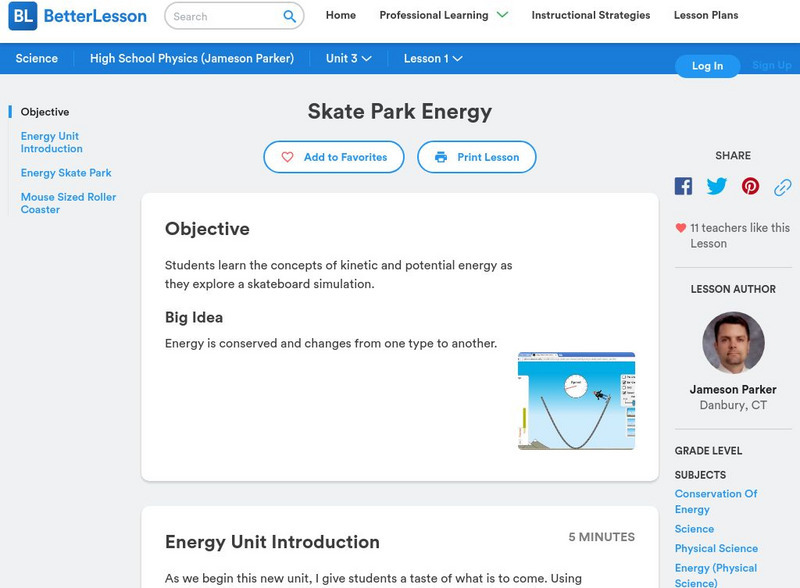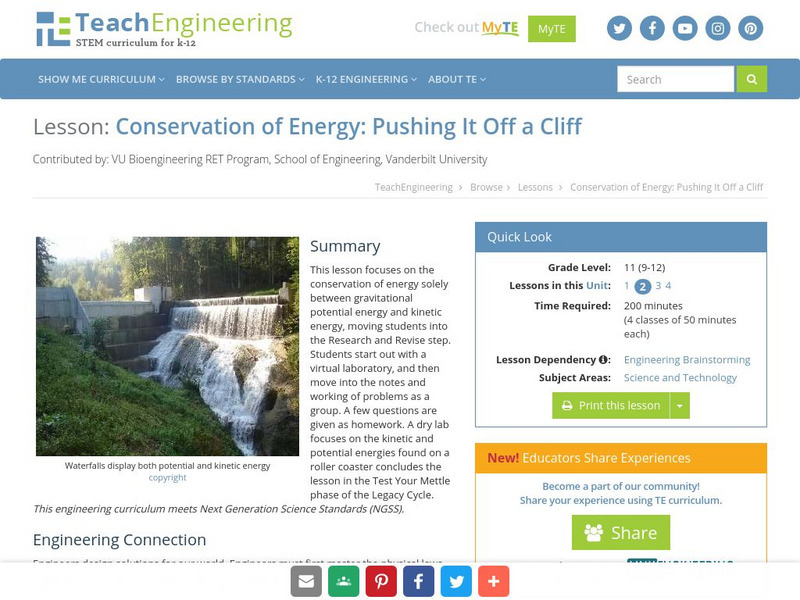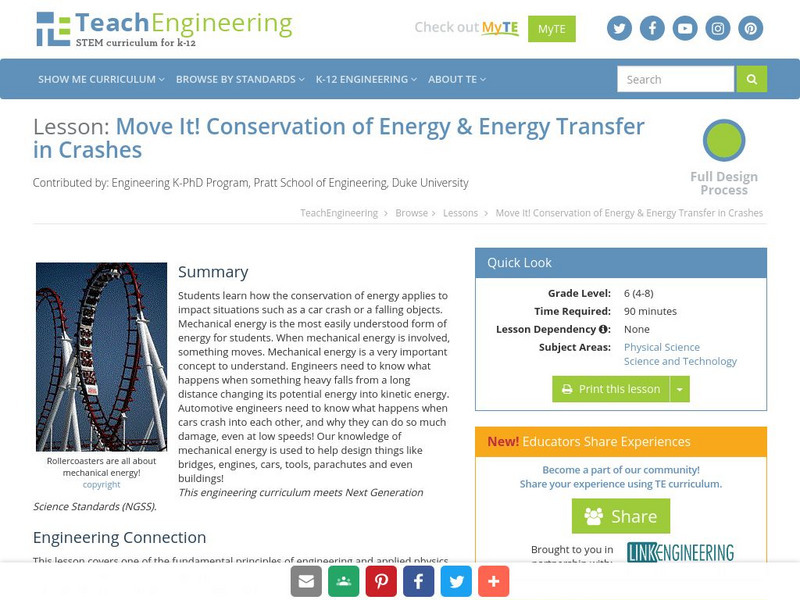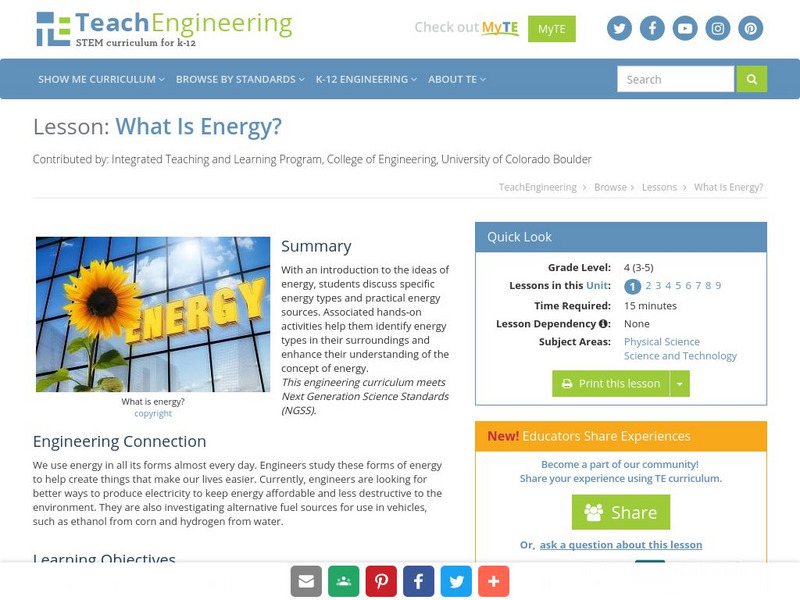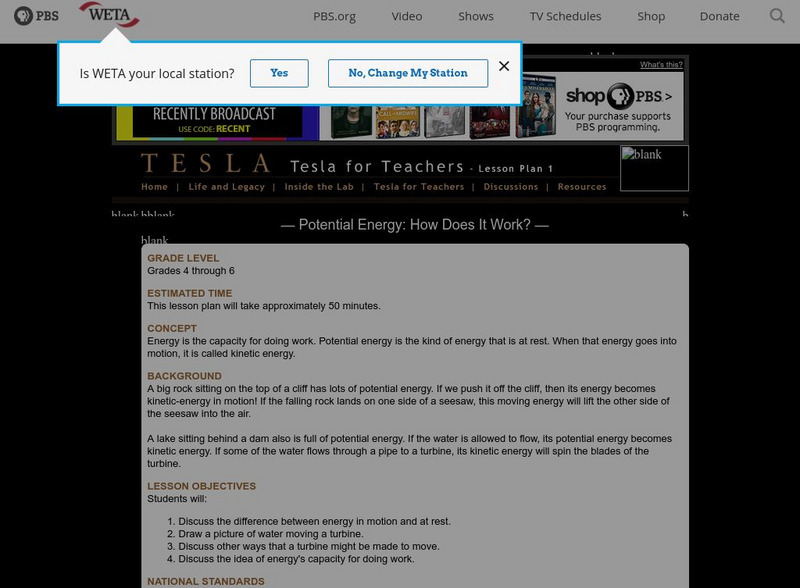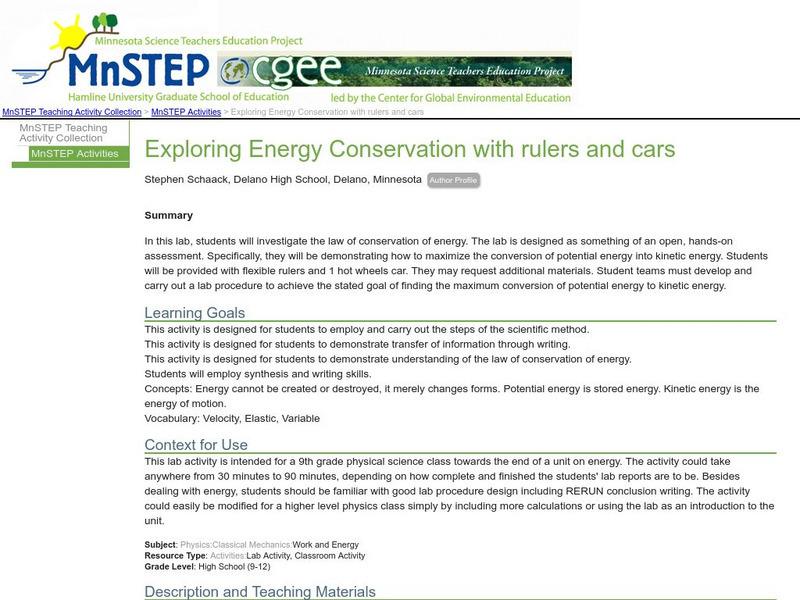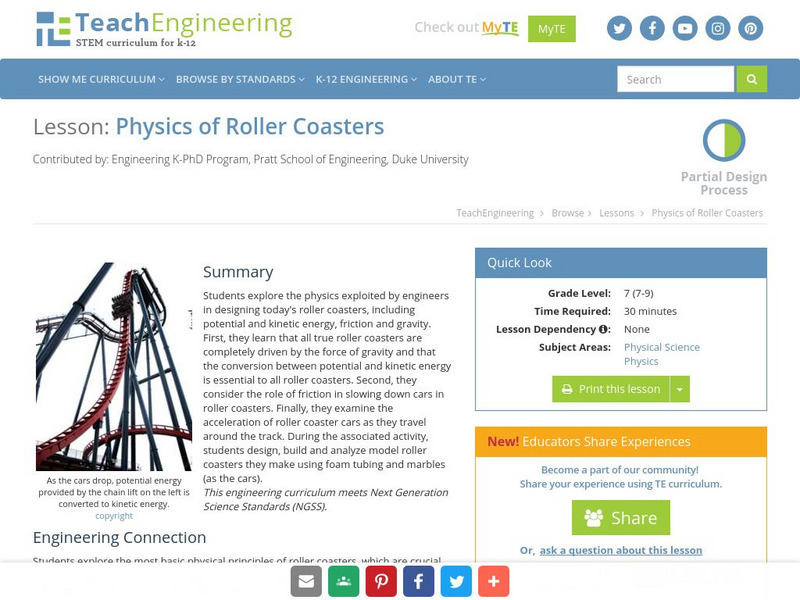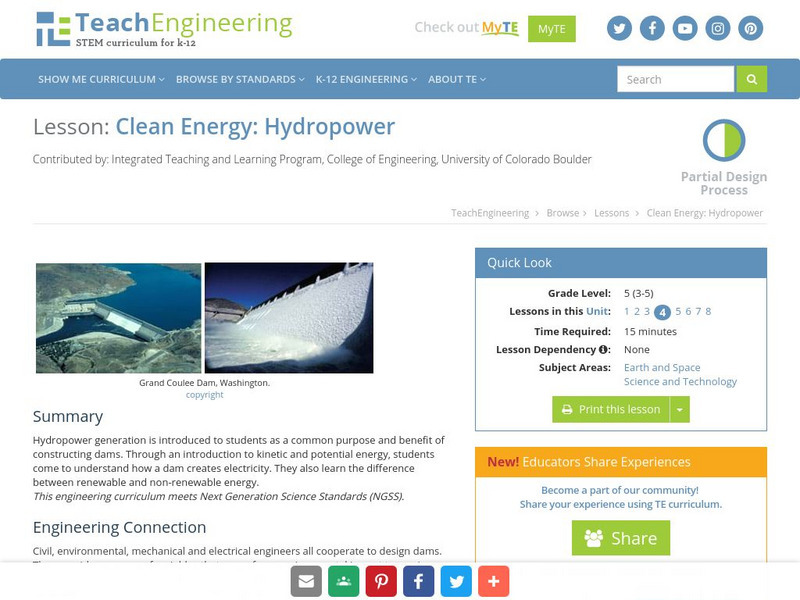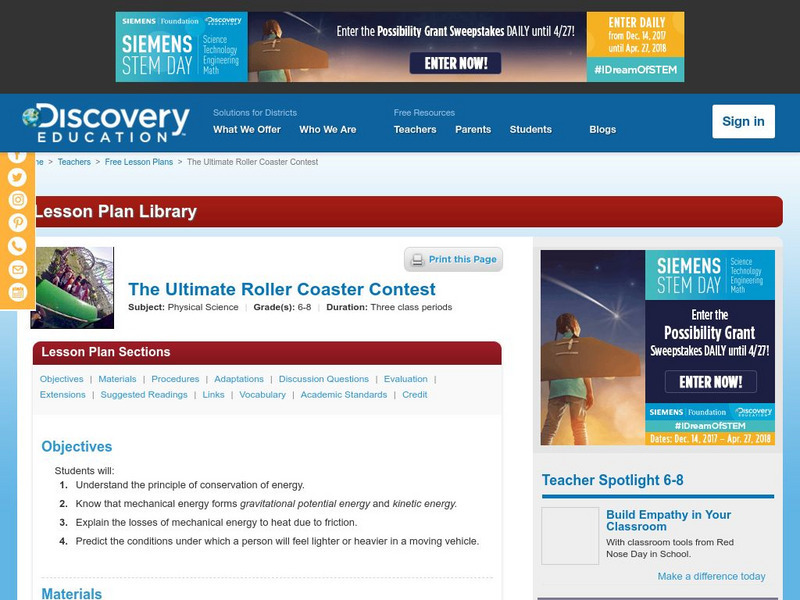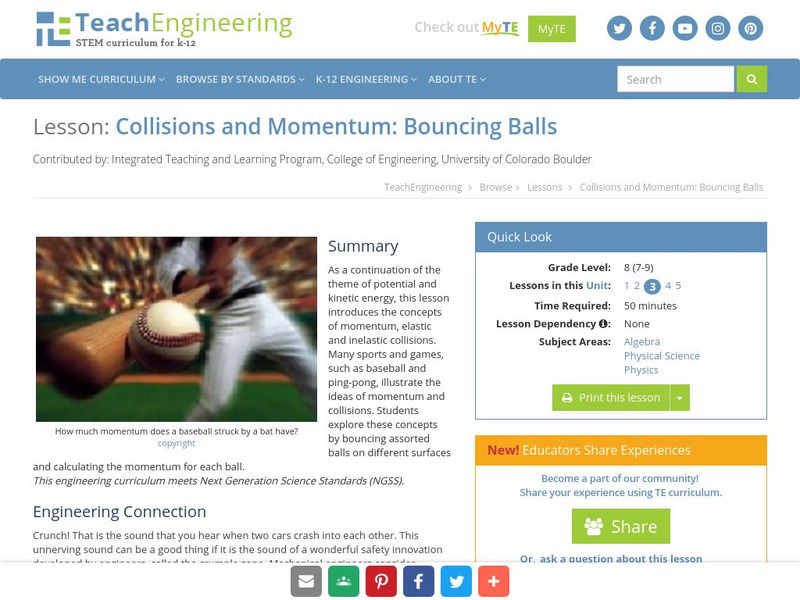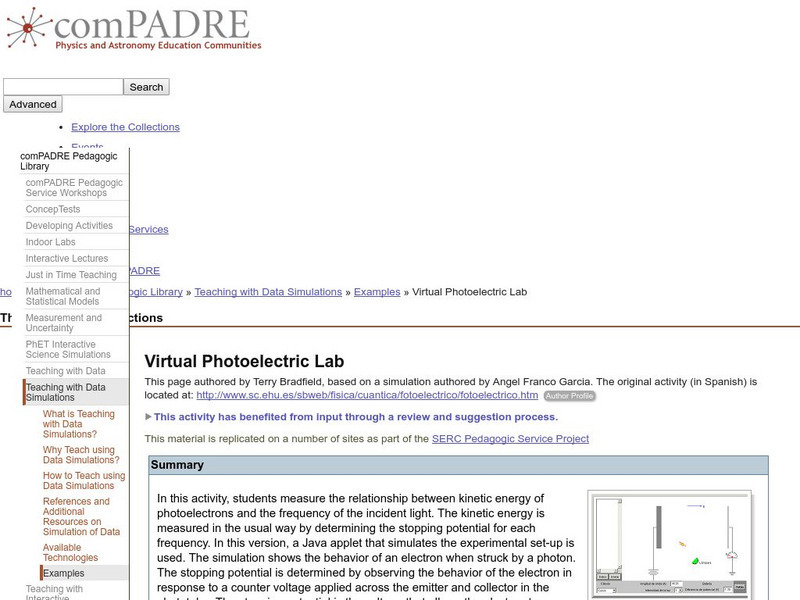Science Education Resource Center at Carleton College
Serc: Maximizing Kinetic Energy: An Investigation Using Marbles
Using marbles to construct a marble run, students will learn about projectile motion, kinetic energy, potential energy, final velocity, and forces.
The Wonder of Science
The Wonder of Science: Ms Ps3 1: Kinetic Energy of an Object
Work samples, phenomena, assessment templates, and videos that directly address standard MS-PS3-1: kinetic energy of an object.
Science Buddies
Science Buddies: Paper Roller Coasters: Kinetic and Potential Energy
In this lesson, your learners will learn about kinetic and potential energy as they build their own roller coasters from simple classroom materials.
Better Lesson
Better Lesson: Skate Park Energy
Using computer simulation, young scholars will explore the concept of conservation of energy at a skate park. After the completion of that exercise, students will move to a worksheet about the concepts with a roller coaster. Site...
TeachEngineering
Teach Engineering: Kinetic and Potential Energy of Motion
In this lesson plan, students are introduced to both potential energy and kinetic energy as forms of mechanical energy. A hands-on activity demonstrates how potential energy can change into kinetic energy by swinging a pendulum,...
The Wonder of Science
The Wonder of Science: 4 Ps3 1: Motion Energy
Work samples, phenomena, assessment templates, and videos that directly address standard 4-PS3-1: motion energy.
TeachEngineering
Teach Engineering: Pushing It Off a Cliff
Lesson 2 moves into the Research and Revise step and focuses on the conservation of energy solely between gravitational potential energy and kinetic energy. Students start out with a virtual laboratory, and then move into the notes and...
TeachEngineering
Teach Engineering: Move It!
Mechanical energy is the most easily understood form of energy for students. When there is mechanical energy involved, something moves. Mechanical energy is a very important concept to understand. Engineers need to know what happens when...
TeachEngineering
Teach Engineering: It's Tiggerific!
In Lesson 3, as part of the Research and Revise step, students investigate potential energy held within springs (elastic potential energy). Class begins with a video of either spring shoes or bungee jumping. Students then move on into...
Better Lesson
Better Lesson: Drop and Pop Energy and Speed Exploration
Fourth graders use a toy to make observations that speed is related to the amount of energy in an object as well as work with gravitational and elastic potential energy.
TeachEngineering
Teach Engineering: What Is Energy?
With an introduction to the ideas of energy, students discuss specific types of energy and the practical sources of energy. Hands-on activities help them identify types of energy in their surroundings and enhance their understanding of...
Science Education Resource Center at Carleton College
Serc: Com Padre: Introduction to Work and Energy: The Hopper Popper Surprise
This activity will provide students with a qualitative understanding of the Work-Energy Theorem, especially on how the energy transferred depends on the distance over which the force is applied.
PBS
Pbs Teachers: Potential Energy: How Does It Work?
Describe the difference between energy in motion and at rest, and demonstrate energy's capacity for doing work. Draw a picture of water moving a turbine, and discuss other ways that a turbine might be made to move.
Science Education Resource Center at Carleton College
Serc: Exploring Energy Conservation With Rulers and Cars
In this lab, students will investigate the law of conservation of energy. The lab is designed as something of an open, hands-on assessment where students demonstrate how to maximize the conversion of potential energy into kinetic energy.
TeachEngineering
Teach Engineering: Physics of Roller Coasters
Students explore the physics utilized by engineers in designing today's roller coasters, including potential and kinetic energy, friction, and gravity. First, students learn that all true roller coasters are completely driven by the...
Science Education Resource Center at Carleton College
Serc: Using Your Marbles: Making Energy Work for You
This activity is based on the common experiment of running a marble down a ramp to do work on a cup. Students will be able to see the relationship between mass and energy of the marble and the ramp height.
Science Buddies
Science Buddies: Balloon Car
Young scholars will design, build, and race balloon-powered cars in this fun lesson that teaches about engineering design and kinetic and potential energy.
The Tech Interactive
The Tech Museum of Innovation: Save the Hiker [Pdf]
Can you build a device that will deliver life-saving treatment to someone in a hazardous situation? During this lesson, students will learn how energy is converted and transferred between objects. Working in groups and through the...
TeachEngineering
Teach Engineering: Imagine Life Without Friction
Students are introduced to the concept of inertia and its application to a world without the force of friction acting on moving objects. When an object is in motion, friction tends to be the force that acts on this object to slow it down...
TeachEngineering
Teach Engineering: Clean Energy: Hydropower
Hydropower generation is introduced to students as a common purpose and benefit of constructing dams. Through an introduction to kinetic and potential energy, students come to understand how a dam creates electricity. They also learn the...
Science Education Resource Center at Carleton College
Serc: Investigating Kinetic Theory: An Inquiry Into the Ideal Gas Law
When an overturned beaker is placed on top of a birthday candle in shallow pan of water, the candle will first go out and then water will appear to creep up the sides of the beaker like magic. Student will hypothesize and investigate why...
Discovery Education
Discovery Education: The Ultimate Roller Coaster Contest
Young scholars design and build a three hill "tennis ball" roller coaster made of cardboard. During the design and building process, students explore the concepts of potential and kinetic energy and how they change as the roller coaster...
TeachEngineering
Teach Engineering: Collisions and Momentum: Bouncing Balls
As a continuation of the theme of potential and kinetic energy, this lesson introduces the concepts of momentum, elastic and inelastic collisions. Many sports and games, such as baseball and ping-pong, illustrate the ideas of momentum...
Science Education Resource Center at Carleton College
Serc: Virtual Photoelectric Lab
In this activity, students measure the relationship between kinetic energy of photoelectrons and the frequency of the incident light.
Other popular searches
- Potential and Kinetic Energy
- Potential Kinetic Energy
- Potential & Kinetic Energy
- Kinetic Energy Questions
- Thermal and Kinetic Energy
- Kinetic Energy Lesson Plans
- Kinetic Energy of Particles
- Kinetic Energy Problems
- Science Kinetic Energy
- Potentail and Kinetic Energy
- Kinetic Energy Experiment
- Pot Entail and Kinetic Energy



